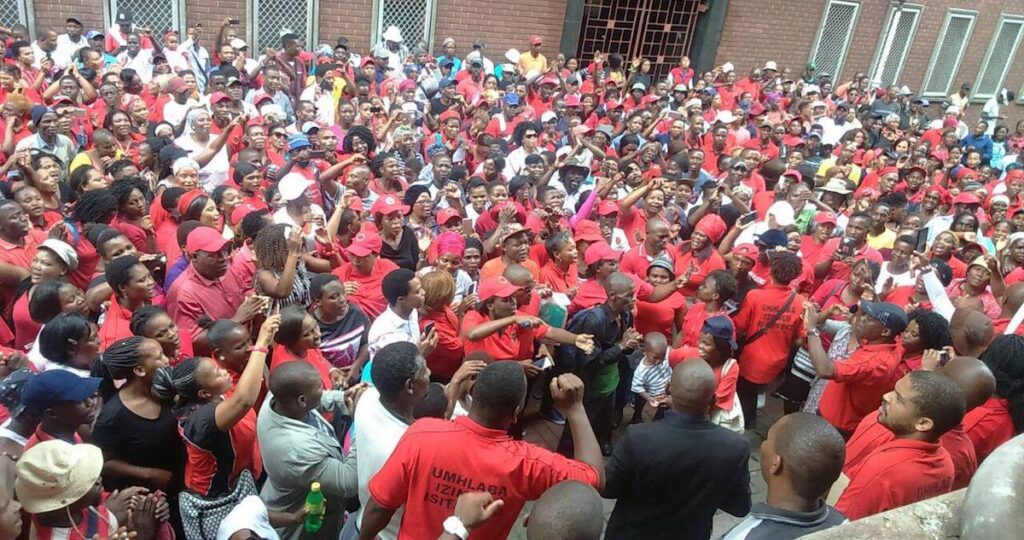
On July 7, 2018, the Kairos Center received notice of heightened attacks and threats against the leadership and members of Abahlali baseMjondolo (Facebook | Twitter), including an assassination attempt on the life of its president, S’bu Zikode. This follows as many as ten assassinations of its members over the past five years and numerous acts of violence by the police. The Kairos Center denounces this violence and defends the right of Abahlali to organize for its rights to housing, land and human dignity enshrined in the Constitution of the Republic of South Africa and the Universal Declaration of Human Rights.
Abahlali is a democratic organization and movement of shack dwellers, people who live in informal settlements on the periphery of cities in South Africa. It was formed in 2005 when members of the Kennedy Road settlement in Durban organized a road blockade to protest the sale of a plot of land that had been promised to them to meet their housing needs. Instead, the land was being sold to an industrial developer. As these politics that prioritize the demands of the wealthy over the demands of the poor have continued, so, too, has the violence against Abahlali. Since 2005, it has faced ongoing evictions, demolitions and fierce government repression, harassment, and police brutality.
At the same time, and in spite of this violence, Abahlali has experienced rapid growth. It currently has branches in five provinces across the country and at least 60 settlements. In the province of KwaZulu-Natal alone, there are more than 40 new land occupations and over 50,000 members.
Even when its peaceful protests are met with police force, even when its members are evicted five, ten and twenty times, receive death threats and are killed, Abahlali continues to grow, because it must. Its settlements must absorb the hundreds and thousands of people being kicked out the cities and off their land. Its children who have grown into adults with their own children in the shacks must find the space to live and breathe and hold space in this world. Abahlali’s members also understand that it is not enough to seek only housing and land. They must also demand water, electricity, decent jobs, dignity, respect and true democracy.
And every time their members are forced to break through the limits of what they can endure, their struggle becomes stronger. Leaders from Abahlali have described this strength forged in struggled as “inkani.” This concept speaks to the stubborn determination that goes beyond the ordinary capacity for resilience. It emerges when you are forced to do for your family or your neighbor or your community more than you thought you were capable of doing. It arises out of deep experiences that are shared in spaces of suffering, prayer, song, joy and reflection that grow into communities of struggle.
Inkani emerges when you are forced to do for your family or your neighbor or your community more than you thought you were capable of doing. It arises out of deep experiences that are shared in spaces of suffering.
The Kairos Center understands inkani to be part of a long tradition of liberative theology, which guides and is discovered through the struggles of the poor and dispossessed. In the Christian context, liberative theology remembers Jesus as a poor man, born homeless, who committed his life to organize the poor and fight the forces that take and degrade life.
This theology emerges from our deep roots in the communities of struggles of the poor and dispossessed in the United States, especially the National Union of the Homeless, the Kensington Welfare Rights Union, the National Welfare Rights Organization, and the contemporary struggles of the homeless in Washington state, California, New York, New Jersey, Tennessee, and other places across the country, alongside struggle for water, health care, education, and more.
The Kairos Center is also grounded in the Poor People’s Campaign: A National Call for Moral Revival and its charge to fight poverty, not the poor. We know that the only way to win this fight is to link these communities of struggle across this country and world together against the forces of violence that are waging a war on the poor.
As Abahlali shared in a statement from July 7, 2017:
We will not retreat. We have faced and survived previous waves of repression, especially in 2009, and again in 2013 and 2014. We have faced and survived all kinds of dirty tricks and lies. In 2018 we are bigger and stronger than we have ever been before. We will survive this wave of repression too.
The Kairos Center stands with Abahlali against these attacks. As we have been singing in the Poor People’s Campaign around the country, “Somebody is hurting our people and we won’t be silent anymore!”
Forward together, not one step back!